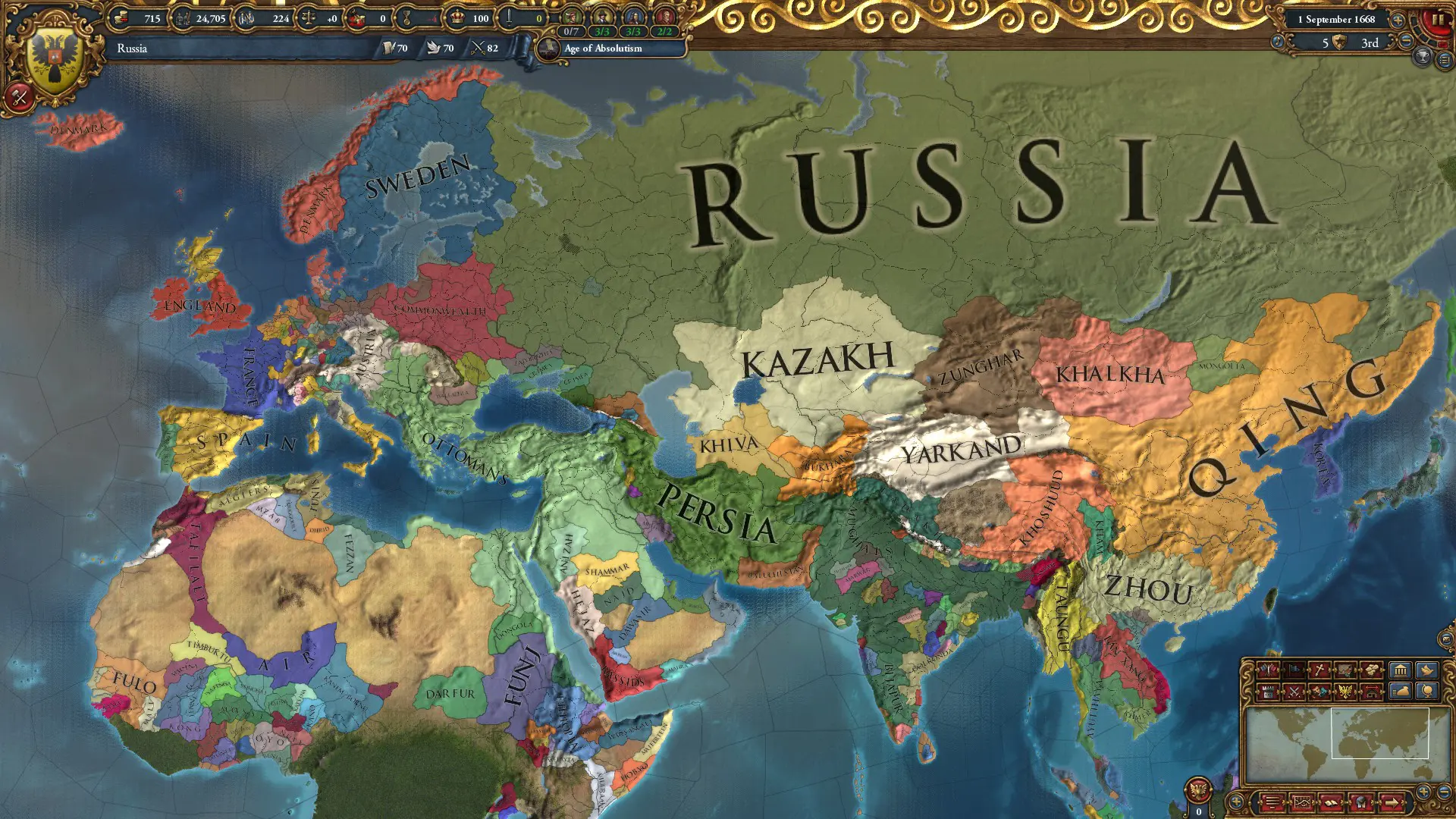
EU4 Guide (Colonization, War, Trade) – Europa Universalis 4
Okay, so you’ve decided to play Europa Universalis IV. You load into your game, and then WHAM, notifications flash atop your screen and you have no idea how to turn your starter nation into a superpower. There are many ways you can go from the starting year, but here are the most imporatant things you should do in order to get started!
As you progress in the game, there always seem to be more features the average Europa Universalis 4 player has not indulged himself with, it is important players delve into the unknown to better their understanding of the contents of the game, the is especially so if the player desires a world conquest.
EU4 Best Starting Nations
If you have played before – Do you remember the first time Europa Universalis opened? I am sure it was overwhelming. New players face a tough question; Which country should I play? Which Country is the best? The game features a diverse selection of playable states, in fact, there are 639 startable nations! Through analysis, we have discovered that different countries hold a magnitude of different problems, and therefore harder countries hold more, and harder problems. For this reason, we have created a list of recommended countries, varied by skill level.
Beginner (Easier)
- Spain
- Portugal
- England
- France
- Ottomans
- Hungary
- Poland
- Venice
Intermediate (Average)
- Denmark
- Sweden
- Muscovy,
- Austria
- Ming
- Oda
- Naples
- Aragon
- Scotland
- Norway
- Bohemia
- Great Horde
Expert (Harder)
- Brandenburg
- Novgorod
- Aztec
- Provence
- Serbia.
EU4 Army, War, and Combat Modifiers
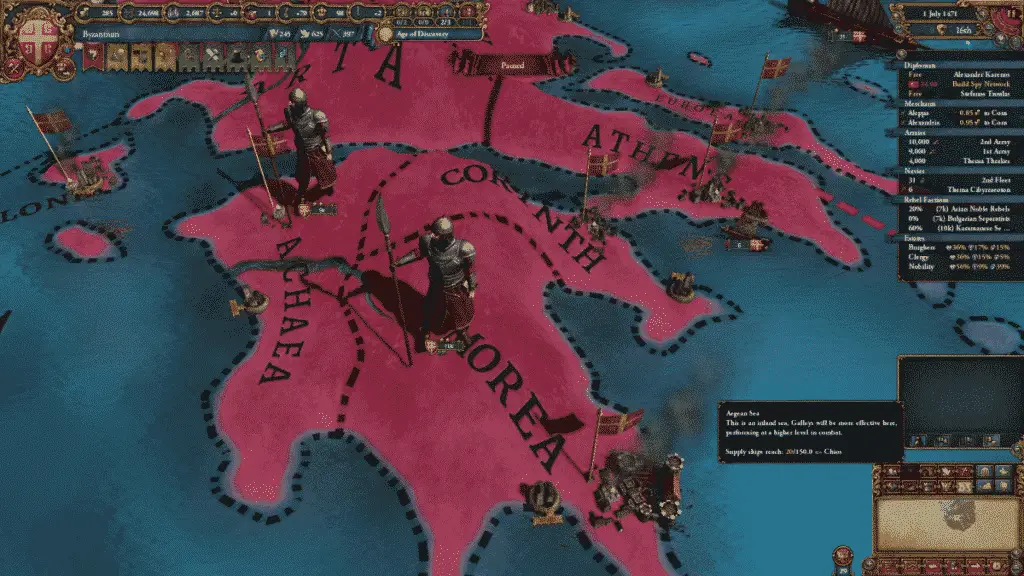
Once a country has been picked, War is inevitable. No matter your size, strength, or location. This is why is vital that players are well equipped for the event and know how to achieve success. But first, you must know how to dull the impact of a defensive war, and how to improve the odds of victory in an offensive war. This can be done via alliances. Alliances are an integral part of Europa Universalis 4, and an educated player knows how to squeeze their allies for all they have got.
The key when selecting an ally is strength and location. It is important to choose your allies carefully because they will not join your war unless they have a reason to. When you ask your ally to join your war (Call to Arms), there are certain modifiers that decides if they support you. Some examples are:
- Relative Manpower
- Distance
- Debt
- Favors
- Attitude
Battles are usually won via quality and quantity. Within wars (Usually) it is important to have equally, or greater troops than your enemies, but it is also important that your discipline and Army morale is kept high. These modifiers can be improved via Ideas; Ideas are investments, available in the early game, that can improve certain aspects of your nation. They are available after administration level 5.
Army Composition
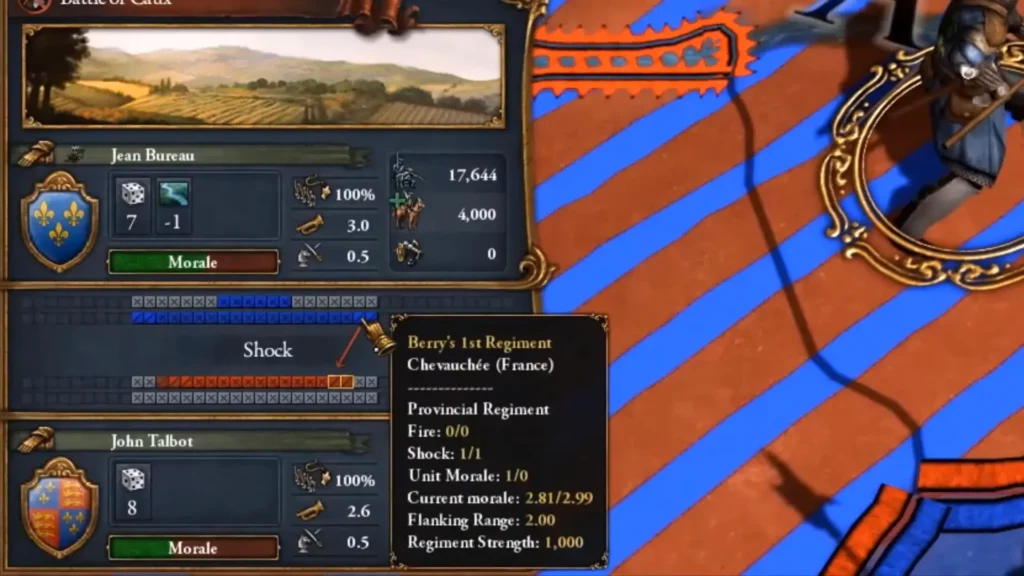
Army unit composition is an important aspect of Europa Universalis 4 (EU4) as it determines how many regiments can fight at once. Your Combat Width, which can be found in the military screen of your country’s interface, is tied to Unit Composition. Increasing your Combat Width can be done by unlocking Military Technology. However, it is important to note that cavalries are useless in the latter part of the game and artillery is weak on the front line. They need to be positioned behind infantry as they are the only units that can attack from the back row. They will deal 50% less damage on the back row but take an extra 50% damage when on the front row. Therefore, it is recommended to ditch cavalries at around Tech 10 and instead use infantry and artillery. Additionally, when in combat, units are reinforced by the back row, so it’s important to keep track of your Military Templates and adjust them accordingly.
Army Discipline
Army Discipline is a crucial aspect of combat in Europa Universalis 4, as it determines the amount of damage inflicted on enemy troops. A higher Discipline, in turn, results in more damage dealt, and when coupled with high Morale, it can significantly increase the chances of winning battles. Some Military Ideas, advisors, and certain policies can increase Discipline, and it’s also possible to get over 170% Discipline by utilizing various factors such as Quality Ideas, Strict Personality of the ruler, and Absolutism. It’s also crucial to keep in mind that a higher Morale is more important at the start of the game, but as the game progresses, Discipline becomes increasingly important.
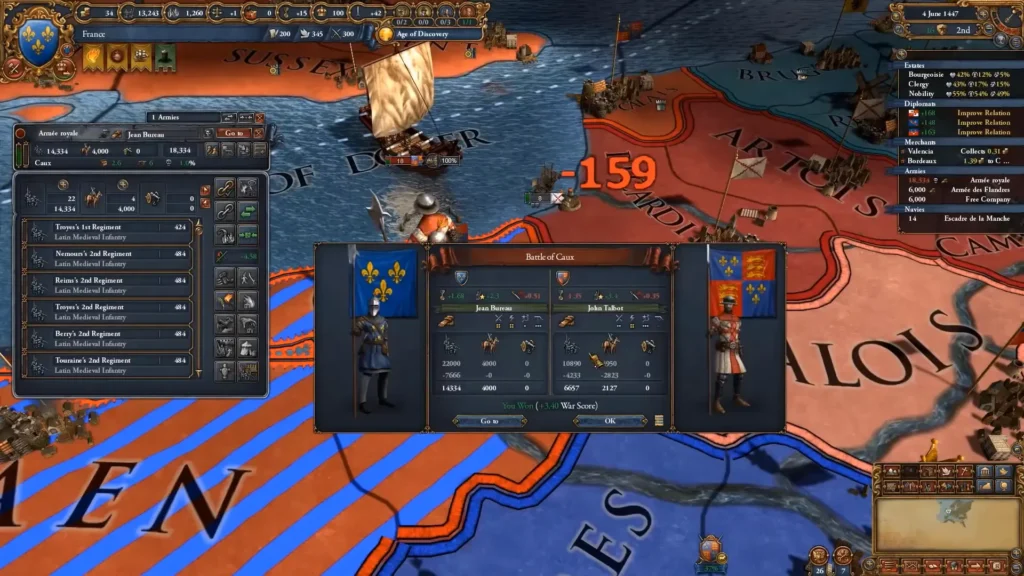
Unit Pips
Unit PIPs are represented by dots on the unit card, and there are three types of PIPs: Fire, Shock, and Morale. Yellow PIPs are offensive and green PIPs are defensive. The number of PIPs a unit has will affect its combat modifiers, making it more or less effective in battle. Military technology level also affects PIPs, and some nations have bonuses to certain units. Generals also have PIPs, which can affect movement speed, attrition, reinforcement speed, and siege speed. PIPs play a significant role in combat, but other factors such as terrain and bonuses also come into play. A good rule of thumb is to use offensive units when you have a larger army and defensive units when outnumbered. Understanding PIPs can help you make better decisions and improve your chances of victory in Europa Universalis 4.
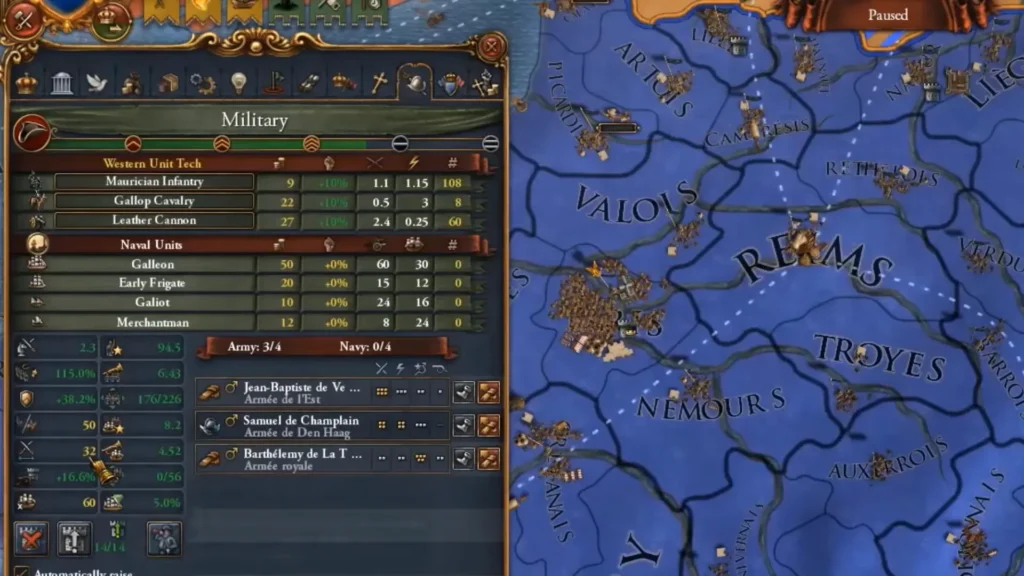
Navy and Army Force Limit
The Force Limit in EU4 is the maximum number of units you can have before incurring penalties. The base limit is determined by your starting nation and the amount of land you have. However, the limit can change during the game and can be increased through various means such as working on ideas, conquering land, and developing buildings. Autonomy of provinces also affects the Force Limit, as it decreases by 0.1% for every percentage of autonomy. Understanding how to increase your Force Limit can help you gain an advantage in battles and conquer more land.
Diplomacy (Alliance, Rival, Royal Marriage)
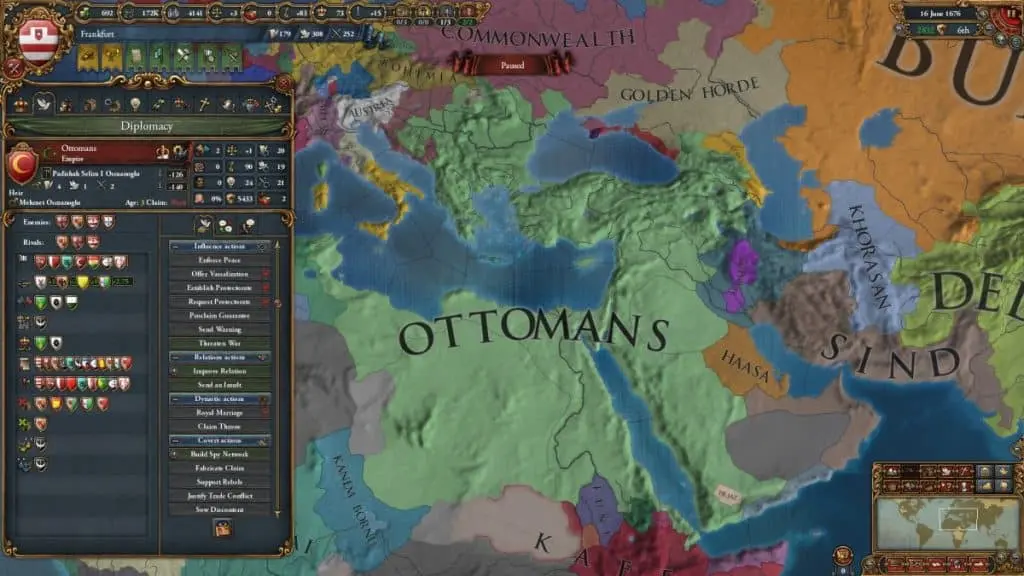
Set Your Rivals Carefully: One of the first notifications you need to address is deciding your rivals. This is a critical first step because, barring a crazy change of circumstance, these rivals will be your primary military target and will oppose you at any turn. On the one hand, the power projection and Casus Belli bonuses provided by attacking your rivals mean that they are always in striking distance. However, there is also no point in alienating possible future allies. If you are France for example, facing likely wars against both England and Austria (for Burgundy) early in the game there is no point in declaring Castile or Aragon as a rival.
While it may be tempting to charge headfirst into the whole world at the start of the game sometimes long-term success comes from picking the right rivals. Make sure not to select an ally that is far away from your state, because they will not feel compelled to join your wars. Once you have gathered your allies and chosen a target, the next step is war. Make sure the relative strength of your allies is greater than your enemies. Within the game, the success/failure of the war is tallied via war score. This can be seen in the bottom right. Certain provinces are worth a greater war score, in contrast to other provinces. An example of this is your enemy’s capital. Your foe’s capital (Depending on the size of your enemy) is usually enough to guarantee a white peace! What is a white peace?, newer players may be asking…
White Peace: A white peace is when both parties in a war decide to return to war conditions before the war. Both parties don’t gain or lose anything.
Crownland
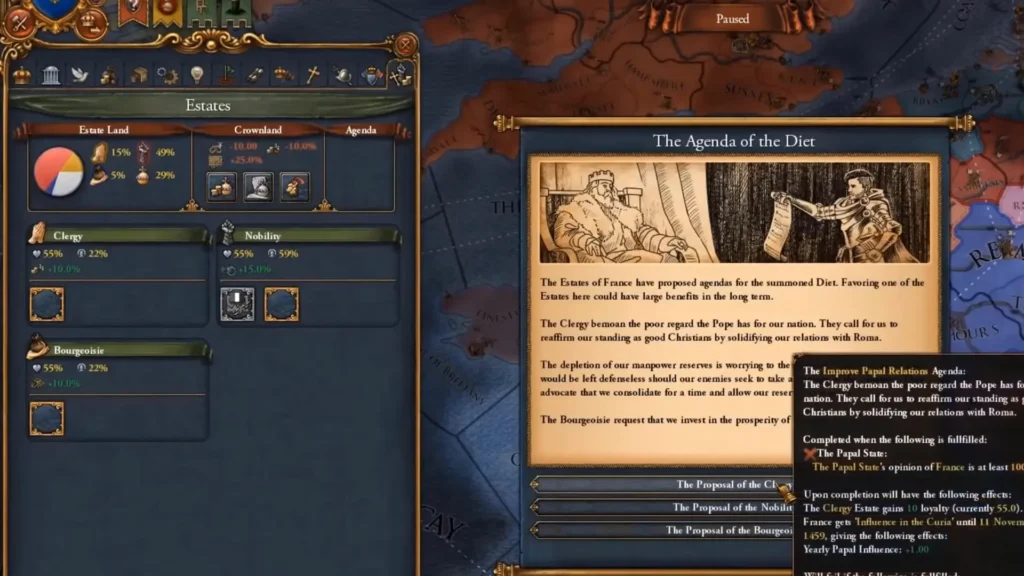
Always remember to take crown land as soon as you load into the game. While some players prefer to not have to jump through the various hoops that come with controlling the estates, it is still important to make sure you avoid the negatives that come with low crown land control.
Almost all nations start at 25-29% crown land, and this can be fixed quickly, easily, and with no immediate consequences. On the other hand, if you are someone who pushes for the bonuses associated with high land control, the sooner you begin consolidating power, the quicker you can reap the rewards.
Religion (Religious Unity)
Religion —similarly to crown land— can rightfully be disregarded early in the game. However religious unity is critical to avoiding disasters, rebellions, and lowering unrest. While the cost associated with converting provinces’ religion can seem to be not worth it, this also depends on which nation you start as.
A small European nation such as Brandenburg, or Hesse —just as examples— probably start 100% Catholic. Other large nations that border many different religious groups —i.e., the Ottomans— will face almost constant religious conversion troubles. This is another example of something that has huge negative long-term effects, but can be solved early.
Best Ideas in Europa Universalis 4
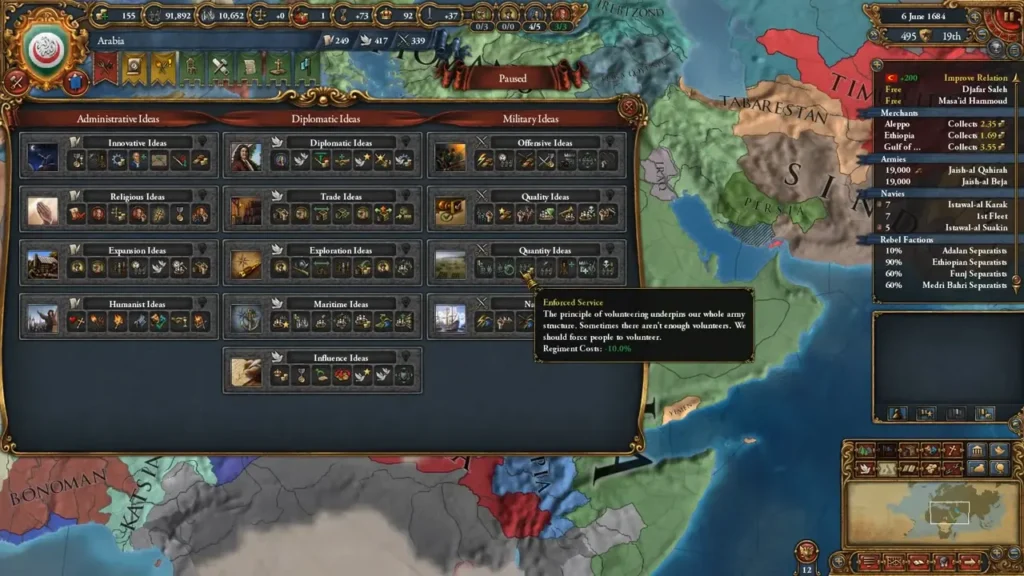
Picking the best EU4 idea groups is a fundamental part of EU4, they can make or break your nation. It’s important to select the right ones as unlocking all ideas in each idea group costs an expensive 2800 monarch points, making it a waste to pick a bad idea group. You usually get your first 3 idea groups within the first 100 years of a campaign, so by about 1550.
It’s vital to pick the right idea groups as it can give you a jump start in your campaign. You unlock your first 3 idea groups at administrative technology levels 5, 7, and 10, respectively. A fundamental principle of EU4 Ideas is to not pick any military ideas in the first three idea groups (except for Brandenberg or France), as military technologies are more important than military ideas. Always pick Administrative Ideas first, as you get a -25% Coring Cost which saves a lot of administrative points. Next, always pick either Religious Ideas or Humanist Ideas as they help with any unrest issues, and during the ‘Age of Reformation’, nations with one of these 2 idea groups will also complete one of the age goals.
Missions and Decisions
If you are interested in making your own way in the world, this may not be a big deal for you. However, if you are considering a path with bonuses or a historical play-through, then checking the mission tree is critical.
Mission trees can provide mass claims as well as other bonuses, depending on the country chosen. Decisions, in particular, are critical if you are trying to create a formable nation. For example, the mission tree for Wallachia gives you claims on all the land you need in order to form Romania. So maybe you want to use the mission trees to take the fast lane to expansion, form Romania, and then abandon the historical path and blaze your own path.
All of these options and more are available by examining the mission trees and then trying to fulfill them.
Trade and Money/Ducats
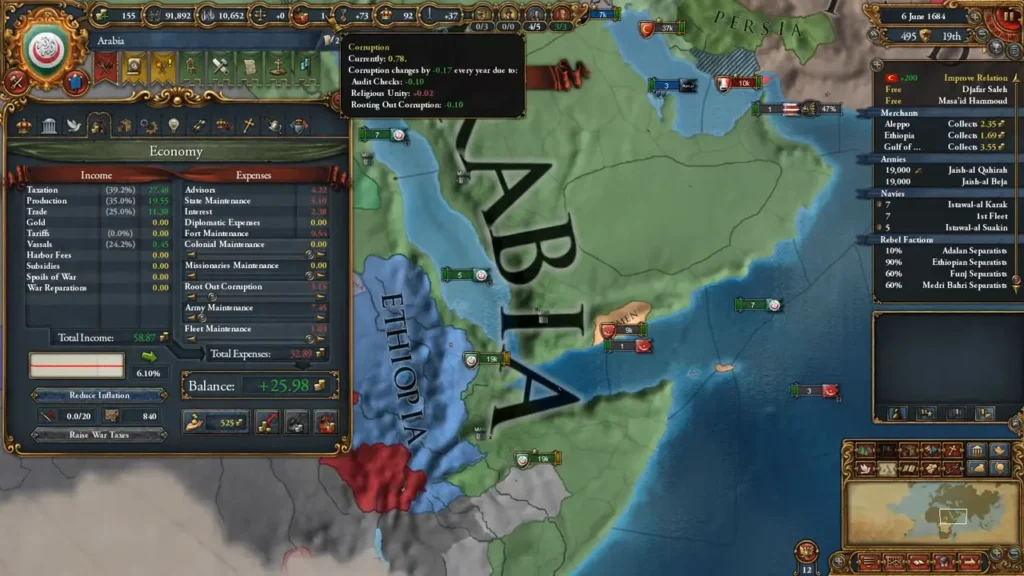
In Europa Universalis 4, a key component of trade is understanding the trade nodes. Each province in the game is associated with a trade node, and many provinces come together to form a trade node. Each trade node has arrows representing the flow of ducats, and players must capitalize on all available trade nodes to maximize their profits. Trade value is another important aspect of trade. It represents the amount of ducats available in a trade node and can be influenced by factors such as incoming trade, local production, and outgoing trade.
Players must also understand trade power, which represents the percentage of ducats a country receives from a trade node. This can be increased by controlling provinces, having downstream trade nodes, and sending lightships. Merchants are also essential in trade, as they convert trade power into usable ducats by conducting missions such as transferring trade power or collecting trade. Other trade mechanics include the ability to force other countries to give up their trade power, and the use of trade leagues to increase profits.
Advisors
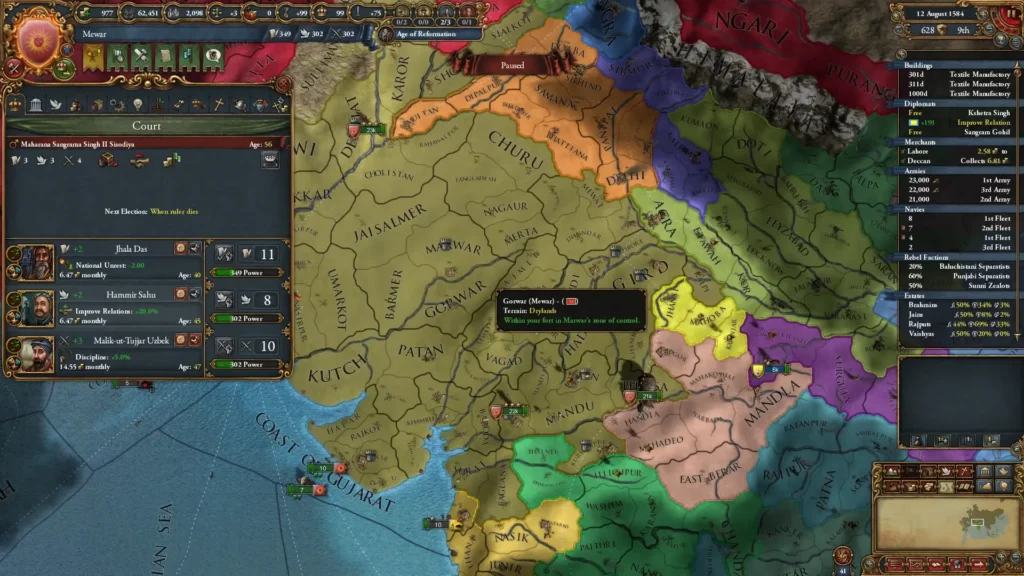
Advisors in Europa Universalis 4 play an important role in the growth and success of a nation. They are hireable characters that provide benefits such as extra monarch points and bonuses, at the cost of ducats. The value of having an advisor may not be immediately apparent, but over time their contribution can be significant. A single advisor provides one to three extra monarch point per month!
Spy Networks
Once you have the military sorted out, it is time to start expanding. Conquering land early in the game, when you are facing smaller nations with no modifiers or major alliances is much easier than staring down late-game behemoths.
In order to do this efficiently, however, you have to begin building spy networks immediately. If you start with three diplomats have two always laying down this foundation for future wars.
Expansion without a claim leads to higher aggressive expansion and increased core costs, which can stall you out through coalitions or a lack of diplomatic power.
How do I Colonize? And which Countries should I Colonize with?
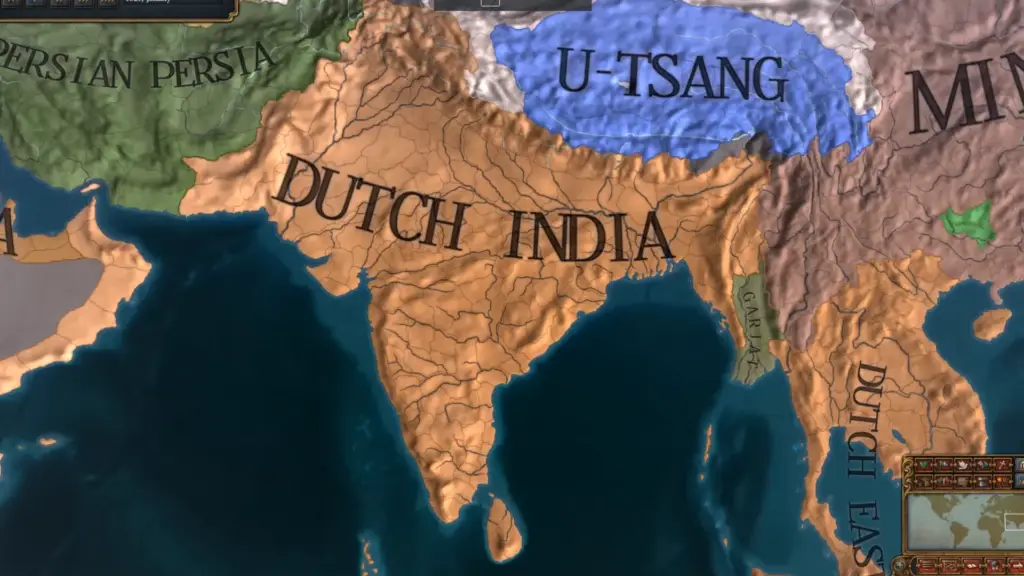
Colonization is a process where residents of a country choose to start inhabiting an area. This process has the potential to pay large dividends, and nations that choose to invest in certain colonial regions, may see large profits. So this must take large sums of money and time to achieve? Wrong. Many colonies are inexpensive, with each colonist only costing 2 ducats per month.
How to Get Colonization in EU4
To colonize, one must first reach administration level 5. This can be done in the Country View (Top Left Flag). Once this has been done, the player must select an idea. 2 Ideas include colonists – colonists represent the number of sustainable colonies that are available to the nation. These are Exploration (Includes 1 colonist), and Expansion (Includes 2 colonists). We recommend any country that wants to colonize the New World, Asia, or Oceania, to first pick Exploration ideas because it provides an explorer. What is an Explorer? You may ask.
An Explorer is a ship captain that allows the fleet is discovered terra incognita (Unknow land).
Best Regions to Colonize RANKED
We recommend prioritizing the colonization of the following areas:
- The Caribbean
- India
- Spice Islands (Indonesia)
- Central America.
Guide to Europa Universalis 4: Which DLCs should I get?
DLC: A extension to the main game that adds new content.
With the large number of DLCs available, it is relatively impossible to play Europa Universalis without a select few DLCs. These DLCS provide us with a whole new range of features to use when playing. Though there are some clear DLCs that have more use than others, this is why we have compiled a list of the most useful DLCs.
Tier 1 (Must Have)
- Rights of Man, Common Sense, Art of War
Tier 2 (Optional)
- Cradle of Civilization, Mandate of Heaven, Cossacks, El Dorado, Wealth of Nation, Mare Nostrum
Tier 3 (Not Needed)
- Conquest of Paradise, Res Publica, Third Rome